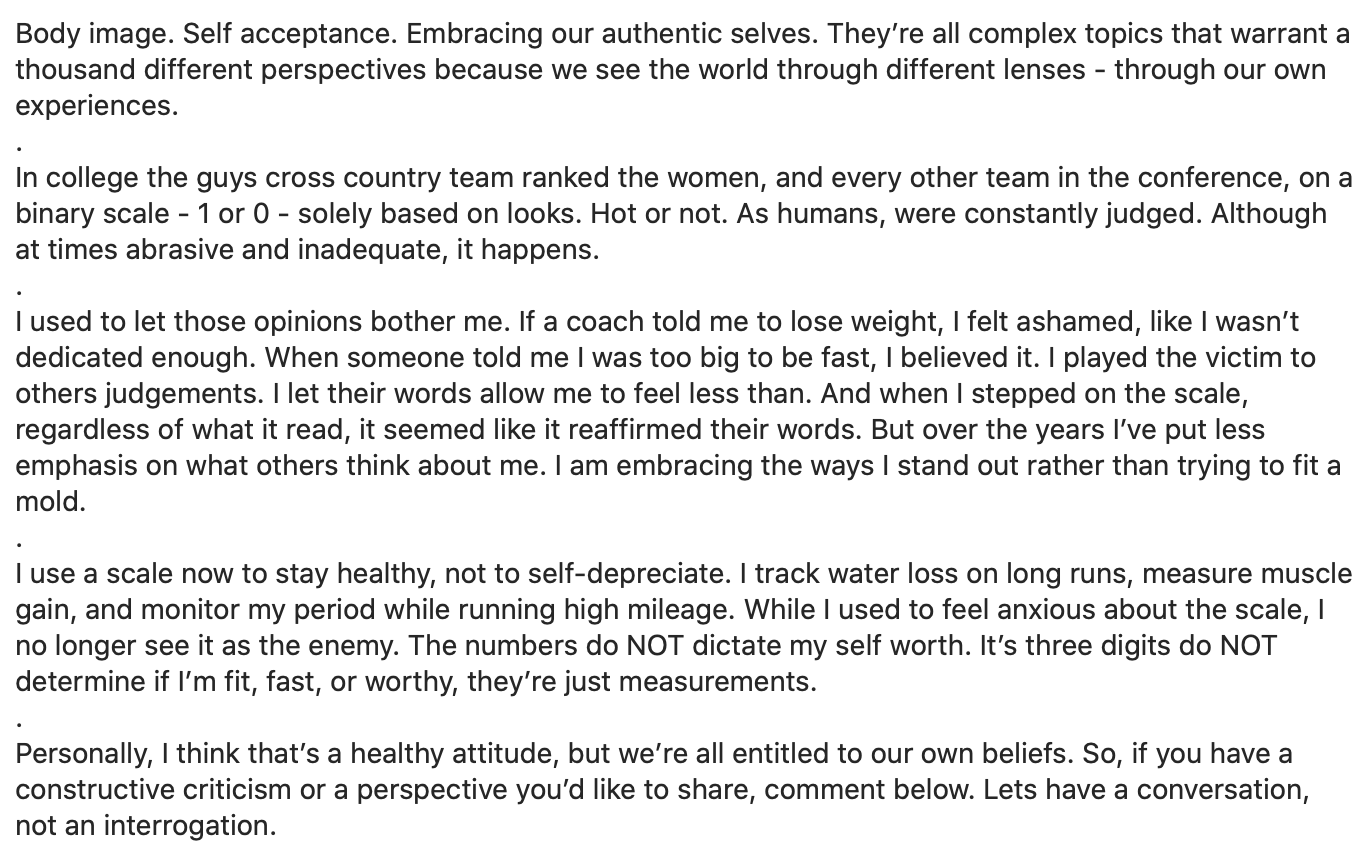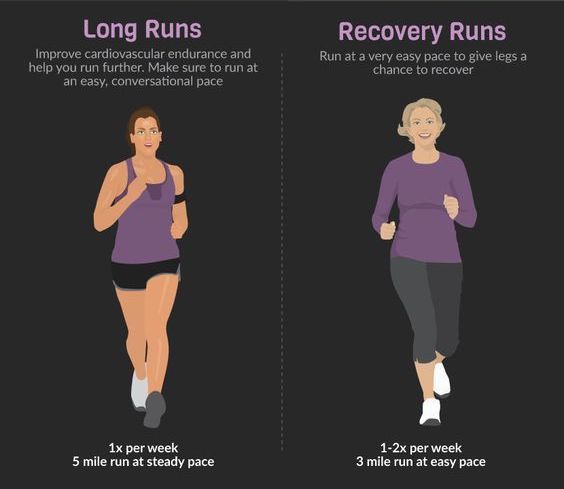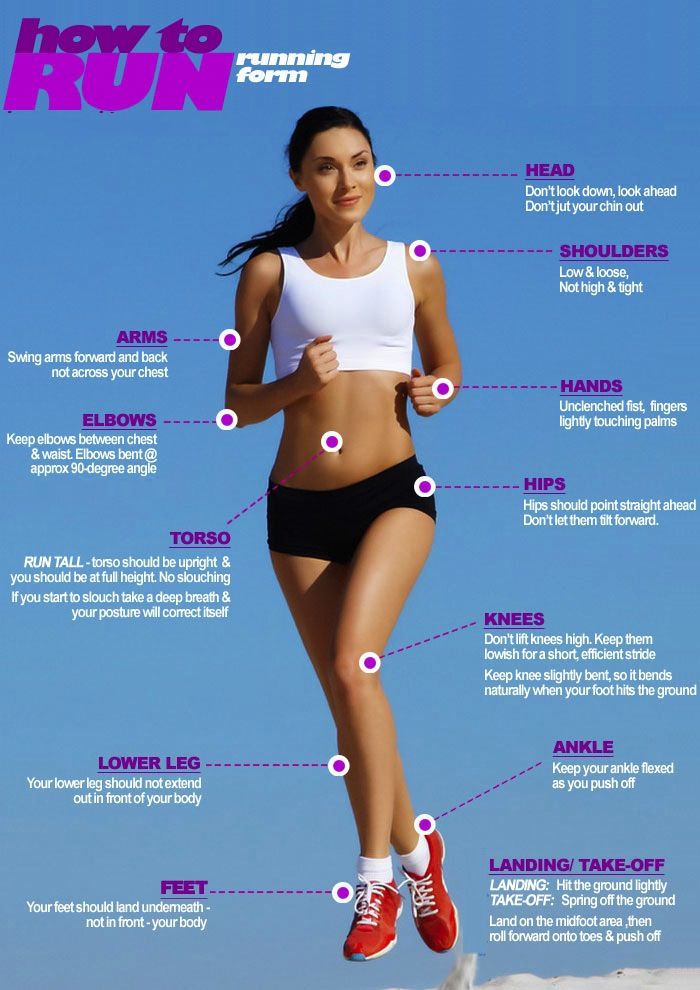2. Don’t Cut Too Many Calories
Let’s say your body needs 2,000 calories to maintain your weight but needs 2,500 when you’re logging extra miles. If you’re eating less than that and your weight drops below a certain point, your metabolism slows down to compensate for the lack of fuel, which means you enter “starvation mode.” Your body holds on to everything it can, making it nearly impossible to maintain weight loss.
WHEN YOUR BODY ENTERS STARVATION MODE, IT BECOMES NEARLY IMPOSSIBLE TO MAINTAIN WEIGHT LOSS.
Instead of slashing calories, aim for a smaller reduction of 250 calories a day, says Bonci. That should result in a loss of half to three-quarters of a pound per week, which won’t flip the starvation switch, even during training. “It will also ensure you’re taking in enough fuel to avoid tapping into your muscles for energy,” she says.
And to boost your calorie burn with exercise, add 20 to 30 minutes of strength training three times a week. Lean muscle burns about five calories per pound while the body is at rest—meaning yes, you can be burning calories while doing nothing. Fat tissue burns only half of that. Or incorporate sprints into your workout. A study from the University of Western Ontario found that people who added four to six 30-second sprints to their runs lost two times more body fat than those who only ran a slow, steady pace.
3. Avoid Falling Victim to Fad Diets
People trying to lose weight often get sucked into the latest trends, such as calorie-free sweeteners, fat-free foods, and gluten-free diets. But for long-term health and success, it’s all about real food and portion control. “The closer to the original source of food, the better,” says Rogan. For example, your muscles can’t use fake sugars for fuel, so if you eat a bar made with erythritol or sucralose before a run, you’ll fatigue faster because your muscles won’t have the carbs they need to perform. The smarter move: Limit sugar intake and use natural sources like honey or agave.
That also means if you’re reaching for skim milk over whole, or reduced-fat PB2 over peanut butter, think again. Not only has the eating-fat-makes-you-fat mentality been disproven, but a whole-milk yogurt or a salad with full-fat dressing will keep you feeling fuller for longer. Plus, fat helps your body absorb more vitamins and antioxidants. Just be sure to—again—limit your intake. “Everything in moderation” advice is so commonly given by experts for a reason.
And that gluten-free craze? Unless you have Celiac disease or a true allergy to gluten, you don’t need to cut gluten out of your diet. A recent study in the journal Gastroenterology supports this, finding that those who were never diagnosed with any kind of gluten intolerance didn’t experience any stomach issues after consuming 14 grams of gluten daily for two weeks.
Plus, “removing gluten can backfire on your weight loss and performance efforts,” says Rogan. Many gluten-free packaged foods are loaded with sugar to compensate for the missing ingredients, and eliminating healthy whole grains means you’re not getting important vitamins, minerals, and nutrients needed for muscle function and recovery.
4. Never Lose the Joy of Running
Sure, you can diligently log your calories in an app, try to run on an empty stomach, and force yourself to eat cacao nibs when you actually want chocolate, but you may end up hangry and eating chocolate anyway. “Dieting is about deprivation. Telling yourself, ‘I can’t eat this,’ over and over again sucks,” says Rebecca Scritchfield, R.D. It also doesn’t work long term: Everyone has a weight set point—a range of 10 to 15 pounds that your body settles into. Once you dip below that range, your brain starts to protect you against further weight loss by cranking out hunger-inducing hormones. “In a war of brain chemistry against willpower, your brain will always win,” says Scritchfield.
Instead, she urges runners to ditch the thou-shall-not-eat lists and run for other benefits, such as improved sleep and increased energy. Eating and sleeping well and exercising can contribute to weight loss on their own, too.
Finally, “It doesn’t matter your size—you’re a runner just by getting out there and running,” Scritchfield says. “Your weight has nothing to do with it.”

Need more proof? After a three-year hiatus, Kieffer returned to competition. She packed her plate with nutritious food and listened to her body’s hunger signals. She gained six pounds, her tibia healed, and last year she placed seventh overall at the 2018 New York City Marathon with her fastest time ever 2:28:12.
“If I just eat healthy foods when I’m hungry, I seem to do much, much better,” she says. “And I’ve rediscovered the happiness of running.”
A true love for sports





Recent Comments